18th ANNUAL MSU ISRAELI FILM FESTIVAL
September 10 and September 14
Sunday, September 10
RCAH Theater, C20 Snyder-Phillips Hall, 362 Bogue St.
Please use the main front entrance of the Snyder building facing Bogue Street
12:30pm Welcome and Intro to Cinema Sabaya with special broadcast cast member Amal Murkus
12:45pm Screening of Cinema Sabaya (1h 31m)
2:15pm Discussion with Amal Murkus
3:00pm Intro to The Narrow Bridge with special broadcast guests Bassam Aramib and Rami Elhanan of the Parents Circle Families Forum
3:15pm Screening of The Narrow Bridge (1h 20m)
4:35pm Discussion with Bassam Aramin and Rami Elhanan
5:15-6:00pm Complimentary dinner
5:15-6:00pm Complimentary dinner by the sculpture in the courtyard between Snyder-Phillips and Mason-Abbot
6:00pm Welcome and Intro to Here We Are
6:15pm Screening of Here We Are (1h 34m)
7:45pm a discussion with Dr. Vered Weiss and Dr. Yore Kedem
Thursday, September 14
RCAH Theater, C20 Snyder-Phillips Hall, 362 Bogue St.
5:00pm Welcome and Intro to The Judge
5:15pm Screening of The Judge (54m)
6:10 Complimentary Pizza outside the Theater
6:20pm Panel discussion following the film with Dr. Yael Aronoff,
Dr. Noga Morag-Levine, Dr. Alon Tal and Dr. Rami Zeedan
Please email us at jewishst@msu.edu with any questions.
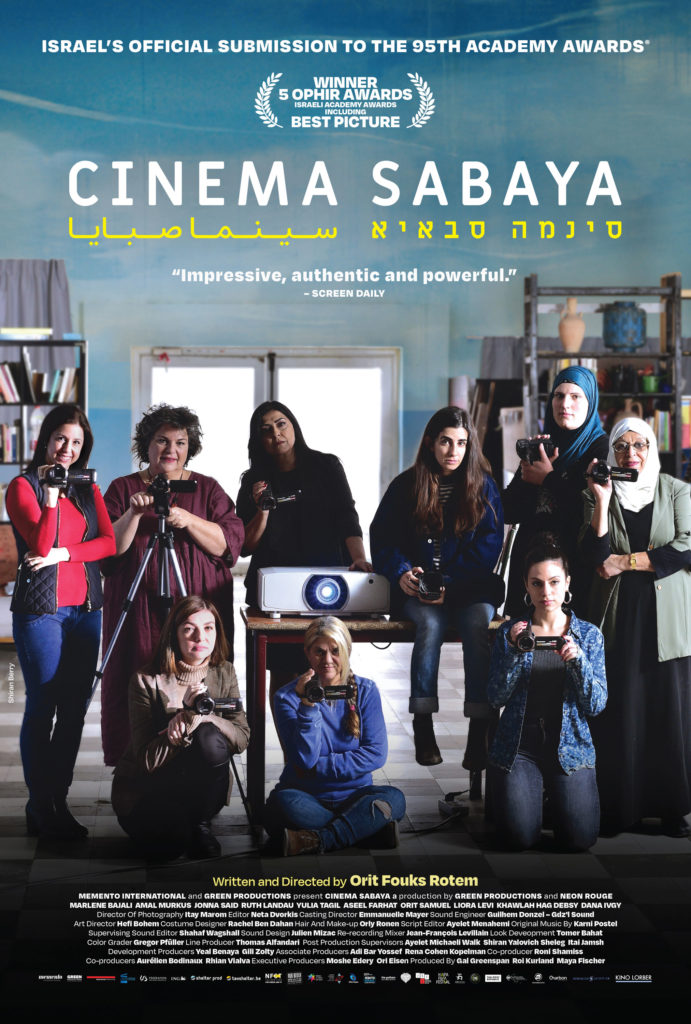 Cinema Sabaya (2021)
Cinema Sabaya (2021)
Followed by a discussion with Dana Ivgi and Amal Murkus
Sunday, September 10, 12:30 pm, RCAH Theater
Drama
Director: Orit Fouks Rotem
Israel. Language: Hebrew (English subtitles)
A group of Arab and Jewish women attend a video workshop at a small town community center run by Rona, a young filmmaker from Tel Aviv, who teaches them to document their lives. As each student shares footage from her home life with the others, their beliefs and preconceptions are challenged and barriers are broken down. The group comes together as mothers, daughters, wives, and women living in a world designed to keep them apart, forming an empowering and lasting bond as they learn more about each other… and themselves. Inspired by writer/director Orit Fouks Rotem’s own experiences as a teacher, Cinema Sabaya presents a deft and heartfelt portrait of art’s capacity to unite disparate communities, moving effortlessly between the gravity of their conversations and the genuine joy generated by this unlikely group of friends. Winner of five Ophir Awards including Best Picture and Best Director and Israel’s Official Submission to the 2023 Academy Awards.
 Amal Murkus is a singer and actress of international renown as well as a producer, songwriter and a host of numerous cultural and artistic TV & radio shows. Amal was born in the Galilee, the northwestern part of Palestine (Israel today), in 1968, and she is part of the Palestinian minority who remained in their homeland. She graduated from Beit Tsvi Conservatory for Performance Arts and later from The Musrara Conservatory for Art for Social Change. Amal is a leading pioneer Palestinian singer and actress who has devoted her career to promoting Palestinian music and culture. Murkus has created and released five albums of songs as well as many single releases and collaborations, all inspired by Arab and Palestinian poetry and tunes, world music rhythms and styles. She tours the world with her music. Her extensive vocal range and creative talents enable Murkus to perform in a wide range of genres, from traditional Arab to modern popular Western styles, which paved the way for numerous collaborations with international artists from different styles such as Mercedes Sosa, Joan Baez, Robert Wyatt, Enzo Avitabile, and Stadio, to name a few.
Amal Murkus is a singer and actress of international renown as well as a producer, songwriter and a host of numerous cultural and artistic TV & radio shows. Amal was born in the Galilee, the northwestern part of Palestine (Israel today), in 1968, and she is part of the Palestinian minority who remained in their homeland. She graduated from Beit Tsvi Conservatory for Performance Arts and later from The Musrara Conservatory for Art for Social Change. Amal is a leading pioneer Palestinian singer and actress who has devoted her career to promoting Palestinian music and culture. Murkus has created and released five albums of songs as well as many single releases and collaborations, all inspired by Arab and Palestinian poetry and tunes, world music rhythms and styles. She tours the world with her music. Her extensive vocal range and creative talents enable Murkus to perform in a wide range of genres, from traditional Arab to modern popular Western styles, which paved the way for numerous collaborations with international artists from different styles such as Mercedes Sosa, Joan Baez, Robert Wyatt, Enzo Avitabile, and Stadio, to name a few.
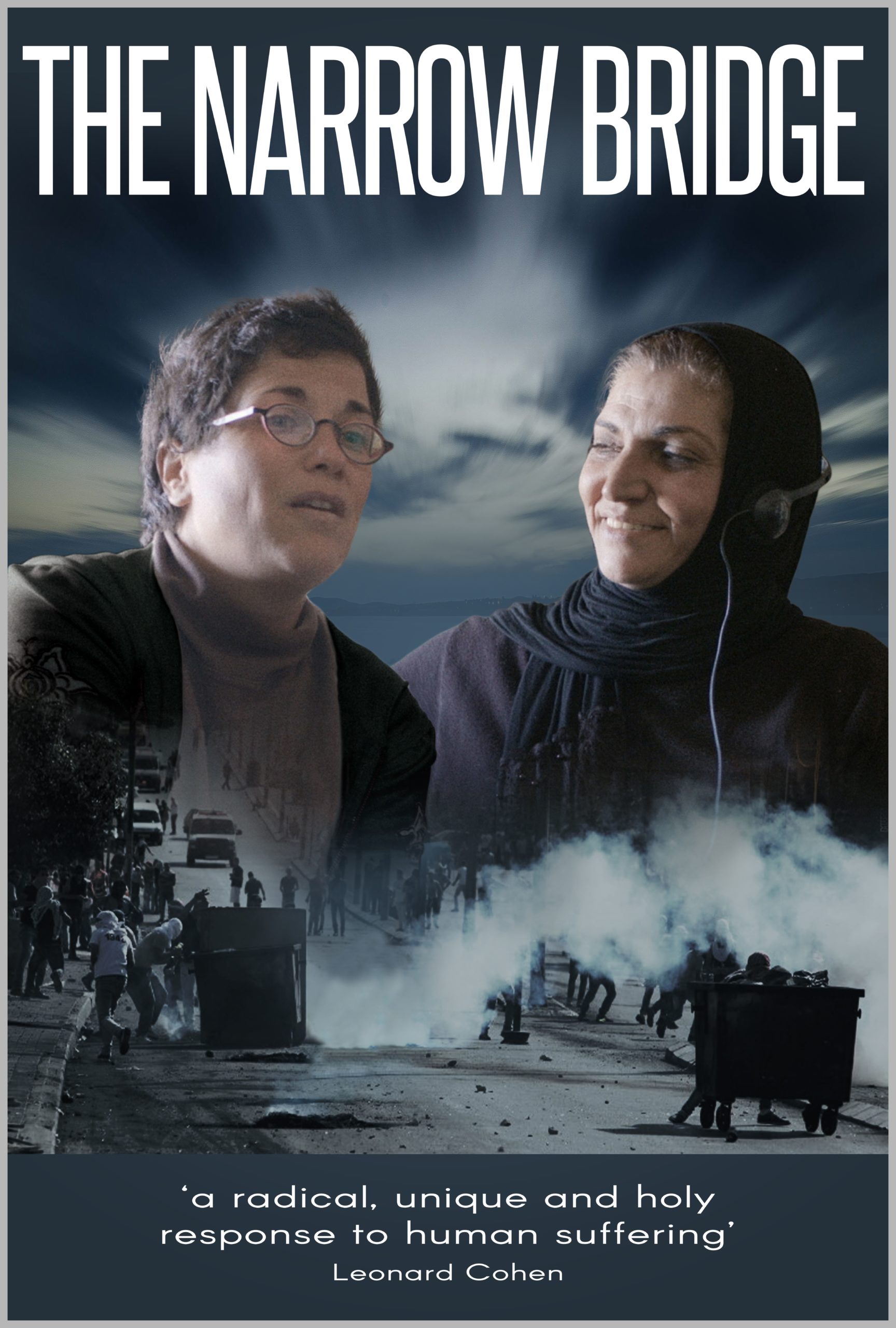 The Narrow Bridge (2021)
The Narrow Bridge (2021)
Followed by a discussion with Bassam Aramin and Rami Elhanan
Sunday, September 10, 3:00 pm, RCAH Theater
Documentary
Director: Esther Takac
Australia, Language: English, Arabic, Hebrew
The Narrow Bridge is a searching journey into the souls of four people who, after searing pain, develop strengths they never had before. We watch with wonder as Bushra, Rami, Meytal and Bassam, women and men who lost a child or parent in violent conflict, transform their grief into a bridge for reconciliation. The film follows their paths from devastating trauma to courageous activism. But their stories are not just personal. They all belong to a controversial grassroots movement of broken-hearted people: ‘Israeli Palestinian Bereaved Families,’ who stand side-by-side to end the violence and build a future based on dignity and equality. Despite fierce political and family opposition, they refuse to give up.
Bassam Aramin and Rami Elhanan are compelling individuals; articulate, passionate and frank. Their candid interviews reveal how the violent deaths of their children affected them. They have each traveled a hero’s journey with a transformation that is startling and complex.
Bassam Aramin lives in Jericho in the West Bank. At the age of 17, he was incarcerated and spent 7 years in an Israeli jail. He went on to study history and holds an MA in Holocaust studies from the University of Bradford, England. In 2005 Bassam was one of the founders of Combatants for Peace, along with Rami’s son Elik. He became a member of the Parents Circle in 2007 after losing his 10-year-old daughter Abir, who was killed by an Israeli border policeman in front of her school. Bassam devotes his time and energies to his conviction for a peaceful, non-violent end to the Israeli occupation and to Israeli-Palestinian reconciliation. Bassam was the Palestinian Co-director of the Parents Circle – Families Forum until August 2020.
Rami Elhanan is a 7th generation Jerusalemite on his mother’s side. His father was an Auschwitz survivor. He is a retired soldier of three wars. Rami identifies himself as a Jew, an Israeli, and before everything else, a human being. On the first day of the school year in 1997, Rami’s 14 years daughter, Smadar, was killed by Palestinian suicide bombers in the center of Jerusalem. A year later, Rami joined the Parents Circle, and speaks before Israeli, Palestinian and International audiences. Rami was the Israeli Co-director of the Parents Circle – Families Forum until August 2020.
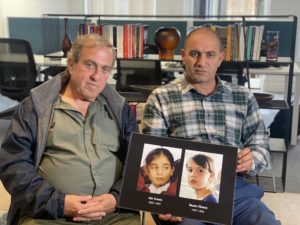
Rami Elhanan, whose daughter was blown up getting books for the new school year, and Bassam Aramin, whose daughter was shot dead while sharing sweets with her sister.
Complimentary dinner (location TBA either in Snyder-Phillips or right outside it) Sunday, September 10, 5:15-6:00 pm, RCAH Theater
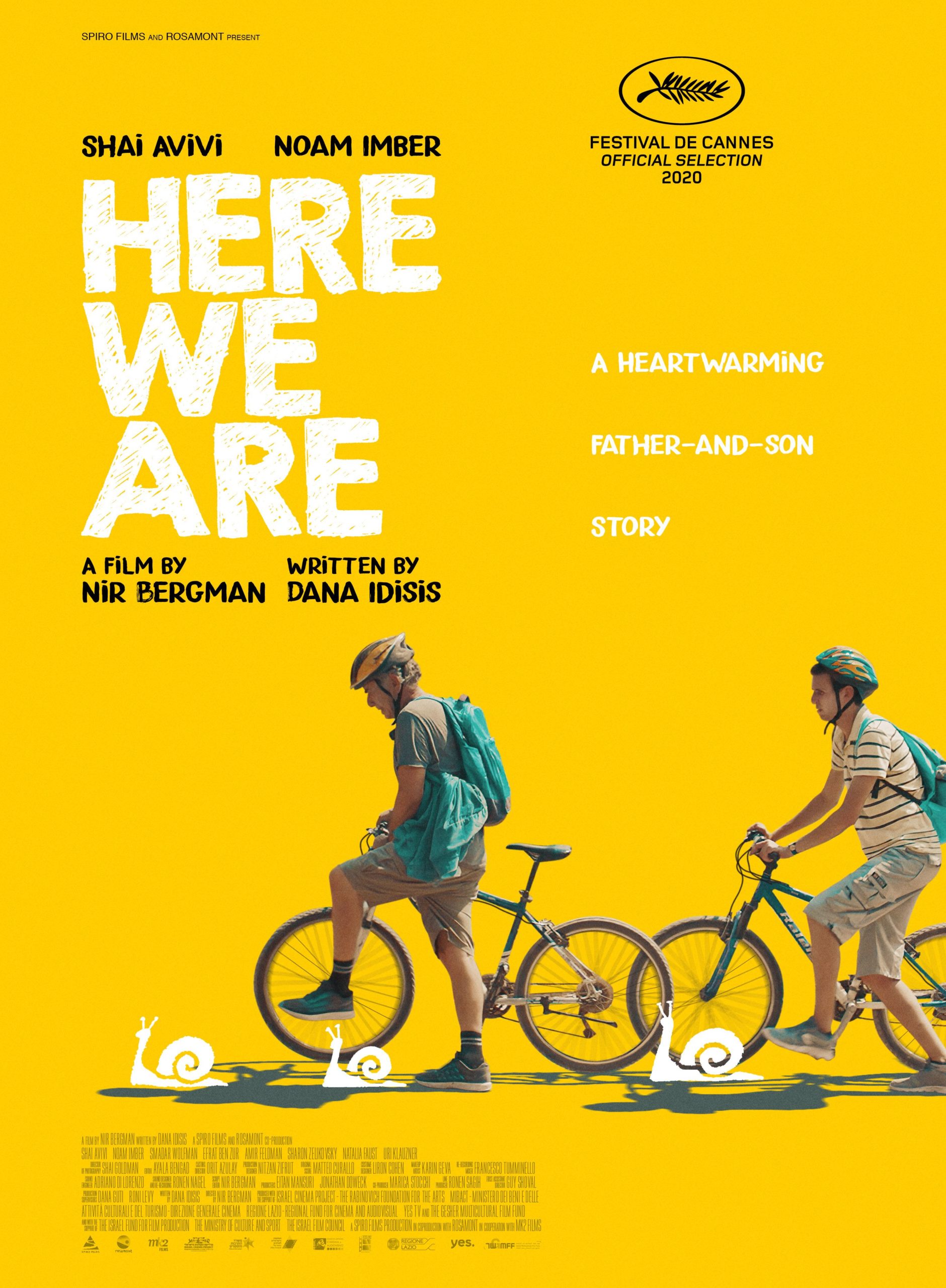 Here We Are (2020)
Here We Are (2020)
Followed by a discussion with Dr. Vered Weiss and Dr. Yore Kedem
Sunday, September 10, 6:00 pm, RCAH Theater
Drama
Director: Nir Bergman
Israel. Language: Hebrew (English subtitles)
Aharon has devoted his life to raising his son Uri. They live together in a gentle routine, away from the real world. But Uri is autistic, and now as a young adult it might be time for him to live in a specialized home. While on their way to the institution, Aharon decides to run away with his son and hits the road, knowing that Uri is not ready for this separation. Or is it, in fact, his father who is not ready?
Nominated for 10 Israeli Ophir Awards.
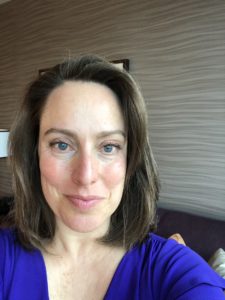
Dr. Vered Weiss is the Serling Israeli Visiting Scholar and The Israel Institute Teaching Fellow at The Michael and Elaine Serling Institute for Jewish Studies and Modern Israel at Michigan State University. Dr. Weiss is a faculty member in the Center for Integrative Studies in the Arts and Humanities, and teaches courses on Israeli culture, Israeli cinema and television, Hebrew literature, as well as world literature. Dr. Weiss is co-editor of Tracing Topographies: Revisiting the Concentration Camps Seventy Years after the Liberation of Auschwitz (Routledge, 2017), and is co-editing a volume about Israeli culture and post-traumatic stress disorder (Lexington, 2023). Her current research project explores the interplay between the location of marginalized characters and the ways in which narrative empathy is formulated in literature, and she is also collaborating on a co-edited book with Elana Gomel about Israeli speculative fiction (Liverpool University Press).
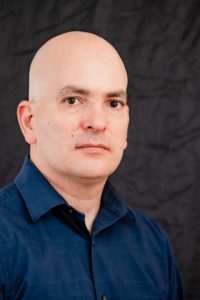 Dr. Yore Kedem is Assistant Professor of Hebrew in the Department of Linguistics, Languages, and Cultures at MSU. In this role, he teaches all Hebrew classes and on occasion an IAH course on immigration. Dr. Kedem led the Jewish Studies Summer Program at Hebrew University in Jerusalem six times, where he taught a class titled Cultural Diversity and Immigration in Israel. Dr. Kedem also taught courses in Israel for Hebrew University and the University of Illinois. His Advanced Hebrew and Education Abroad classes revolve around students’ research projects. These projects investigate issues of students’ interest within Israeli society and culture and enable them to work as independent researchers. Almost every year his students present their projects in undergraduate research conferences at MSU.
Dr. Yore Kedem is Assistant Professor of Hebrew in the Department of Linguistics, Languages, and Cultures at MSU. In this role, he teaches all Hebrew classes and on occasion an IAH course on immigration. Dr. Kedem led the Jewish Studies Summer Program at Hebrew University in Jerusalem six times, where he taught a class titled Cultural Diversity and Immigration in Israel. Dr. Kedem also taught courses in Israel for Hebrew University and the University of Illinois. His Advanced Hebrew and Education Abroad classes revolve around students’ research projects. These projects investigate issues of students’ interest within Israeli society and culture and enable them to work as independent researchers. Almost every year his students present their projects in undergraduate research conferences at MSU.
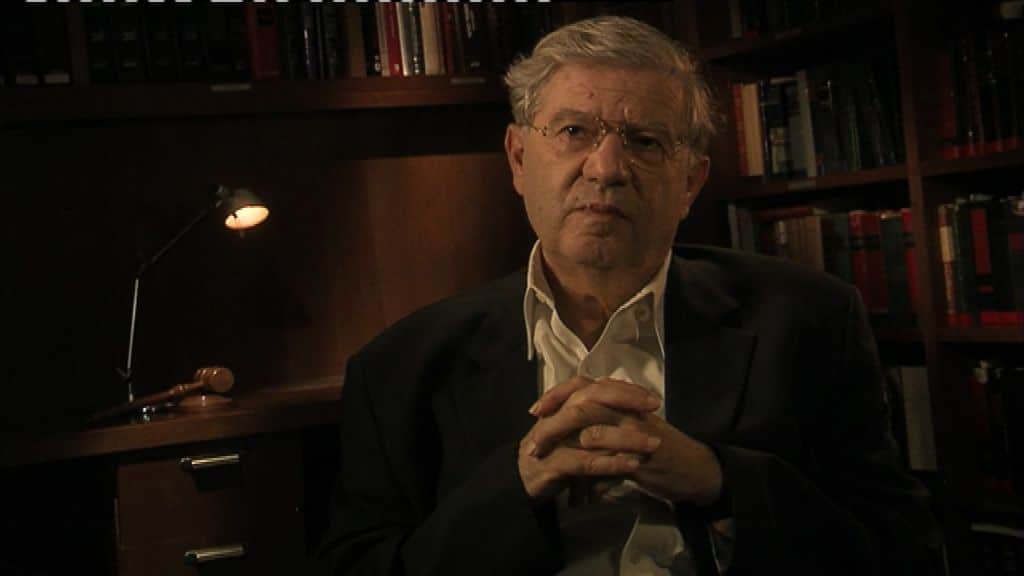 The Judge (2009)
The Judge (2009)
Followed by a Panel discussion with Dr. Yael Aronoff, Dr. Noga Morag-Levine, Dr. Alon Tal and Dr. Rami Zeedan
Thursday, September 14, 5:00 pm, RCAH Theater
Documentary
Directors: Ram Landes and Ami Teer
Israel, Language: English, Hebrew (English subtitles)
Few judges anywhere have confronted the challenges faced by Aharon Barak, the former Chief Justice of Israel’s Supreme Court. A survivor of the Holocaust, he knows firsthand the dangers posed by intolerance and xenophobia, and spent his career negotiating a delicate balance between Israel as a Jewish state and Israel as a democracy. Though often controversial, his rulings have become textbook cases for law students around the world. During his tenure Barak never spoke to the media. Now that he feels his time is running out, he has agreed to bare his soul—the soul of a judge—on camera for the very first time.
6:15-8:00pm “ISRAEL’S DEMOCRACY IN CRISIS: DOMESTIC AND FOREIGN POLICY IMPLICATIONS”
The symposium will be live-streamed here
A panel of four experts will discuss the new Israeli government’s efforts to overhaul the judicial system and weaken the Supreme Court, and more broadly, the domestic and foreign policy implications of the current government’s efforts to weaken the checks and balances system, and to expand and entrench Israeli settler presence on the West Bank. What, they will ask, are the underlying causes and triggers for the government actions, and what are the perspectives of the many people and societal sectors who have been protesting these actions for months? They will also discuss potential implications for a variety of issues, including for Arab-Palestinian society in Israel, for differing Druze and Palestinian narratives about the changes, as well as for women’s rights and on environmental protections. They will also discuss the Court’s consideration, on September 12th, of the many petitions filed in order to deem the new government’s new law unconstitutional. This new law bars the judiciary from striking down decisions by the government and cabinet ministers on the basis of being unreasonable.
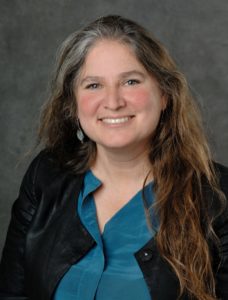 Dr. Yael Aronoff is the Director of the Michael and Elaine Serling Institute for Jewish Studies and Modern Israel, is the Serling Chair of Israel Studies, and is Professor of International Relations in James Madison College at MSU. Dr. Aronoff is past President of the Association of Israel Studies. Her book, The Political Psychology of Israeli Prime Ministers: When Hard-Liners Opt for Peace, (Cambridge University Press 2014), compares and contrasts six Israeli prime ministers and their decision-making on the Israeli-Palestinian conflict. Dr. Aronoff’s co-edited book, Continuity and Change in Political Culture: Israel and Beyond, with Ilan Peleg and Saliba Sarsar, (Lexington Books, 2021), includes contributions from ten leading scholars in political science, anthropology, Israel studies, and Middle East affairs that address the theme of continuity and change in political culture as a tribute to Professor Myron (Mike) J. Aronoff. Her recent publications include “Jerusalem: My Favorite City in the World!” in What Jerusalem Means to Us: Jewish Perspectives and Reflections, Eds. Saliba Sarsar and Carole Monica C. Burnett, Jerusalem Peace Institute and Noble Book Publishing Inc., 2023; “Prime Minister Benjamin Netanyahu,” Handbook of Israeli Democracy, ed. P.R. Kumaraswamy, Palgrave, 2022; and “The Zionist Center-Left Opposition to the Netanyahu Governments,” in Israel Under Netanyahu: Domestic Politics and Foreign Affairs, ed. Robert Freedman, Routledge, 2019. Dr. Aronoff has published in Foreign Policy, Israel Studies, Israel Studies Review, and Political Science Quarterly, and is on the editorial boards for Israel Studies Review and Israel Studies.
Dr. Yael Aronoff is the Director of the Michael and Elaine Serling Institute for Jewish Studies and Modern Israel, is the Serling Chair of Israel Studies, and is Professor of International Relations in James Madison College at MSU. Dr. Aronoff is past President of the Association of Israel Studies. Her book, The Political Psychology of Israeli Prime Ministers: When Hard-Liners Opt for Peace, (Cambridge University Press 2014), compares and contrasts six Israeli prime ministers and their decision-making on the Israeli-Palestinian conflict. Dr. Aronoff’s co-edited book, Continuity and Change in Political Culture: Israel and Beyond, with Ilan Peleg and Saliba Sarsar, (Lexington Books, 2021), includes contributions from ten leading scholars in political science, anthropology, Israel studies, and Middle East affairs that address the theme of continuity and change in political culture as a tribute to Professor Myron (Mike) J. Aronoff. Her recent publications include “Jerusalem: My Favorite City in the World!” in What Jerusalem Means to Us: Jewish Perspectives and Reflections, Eds. Saliba Sarsar and Carole Monica C. Burnett, Jerusalem Peace Institute and Noble Book Publishing Inc., 2023; “Prime Minister Benjamin Netanyahu,” Handbook of Israeli Democracy, ed. P.R. Kumaraswamy, Palgrave, 2022; and “The Zionist Center-Left Opposition to the Netanyahu Governments,” in Israel Under Netanyahu: Domestic Politics and Foreign Affairs, ed. Robert Freedman, Routledge, 2019. Dr. Aronoff has published in Foreign Policy, Israel Studies, Israel Studies Review, and Political Science Quarterly, and is on the editorial boards for Israel Studies Review and Israel Studies.
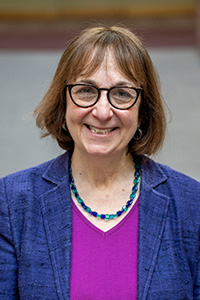 Dr. Noga Morag-Levine is a professor of law and the George Roumell Faculty Scholar at Michigan State University College of Law. Her teaching and research interests include constitutional law, environmental law and history, and comparative law. She is the author of Chasing the Wind: Regulating Air Pollution in the Common Law State (Princeton University Press, 2003) as well as numerous articles. She holds a law degree from the Hebrew University of Jerusalem and a Ph.D. from the University of California, Berkeley. In addition to Michigan State, she has been a faculty member or taught courses at the University of Michigan, Princeton University, the Hebrew University Faculty of Law, and the Law Faculty at Tel Aviv University.
Dr. Noga Morag-Levine is a professor of law and the George Roumell Faculty Scholar at Michigan State University College of Law. Her teaching and research interests include constitutional law, environmental law and history, and comparative law. She is the author of Chasing the Wind: Regulating Air Pollution in the Common Law State (Princeton University Press, 2003) as well as numerous articles. She holds a law degree from the Hebrew University of Jerusalem and a Ph.D. from the University of California, Berkeley. In addition to Michigan State, she has been a faculty member or taught courses at the University of Michigan, Princeton University, the Hebrew University Faculty of Law, and the Law Faculty at Tel Aviv University.
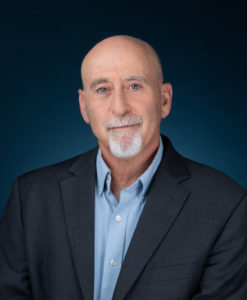
Dr. Alon Tal’s career has been a balance between academia and public interest advocacy. He is presently a professor at Tel Aviv University where he previously served as chair of the Department of Public Policy. Between 2021 and 2022, he was member of the Knesset, Israel’s parliament, and served as chair of the subcommittee for Environmental and Climate Impacts on Health. Tal has held faculty appointments at Stanford, Ben Gurion, Hebrew, Michigan State, Otago and Harvard Universities. He has founded several environmental organizations including the Israel Union for Environmental Defense, the Arava Institute, and Zafuf, the Israel Forum for Population, Environment, and Society. Between 2010 and 2013 Tal served as chair of Israel’s Green Party, “the Green Movement.” His most recent book: Making Climate Tech Work: Policies that Drive Innovation is due out with Island Press in 2024.
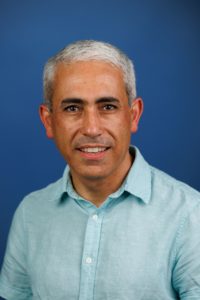 Dr. Rami Zeedan is associate professor of Israel Studies in the Jewish Studies program at the University of Kansas. His research focuses on the Arab society in Israel in the context of an ethnic minority in a nation-state while examining several aspects: Arab politics at the national level and integration in the Israeli polity, the status of Arab local governments and local leadership, public opinion, election predictions, and the history of the integration of Arabs in the Israeli Defense Forces (IDF). Dr. Zeedan is the author of several academic articles and two books: The Arab-Palestinian Society in the Israeli Political System: Integration Versus Segregation in the Twenty-First Century. (Lexington Books, 2019) and Battalion of Arabs–The History of the Minorities Unit in the IDF (Modan, 2015, Hebrew). His current research project aims to discover the role of the IDF minorities’ unit in Israel’s wars, mainly the War of 1967 (Six-Day War) and the War of 1973 (Yom Kippur War), and how it helped shape the process of integration of the Druze in Israel’s society.
Dr. Rami Zeedan is associate professor of Israel Studies in the Jewish Studies program at the University of Kansas. His research focuses on the Arab society in Israel in the context of an ethnic minority in a nation-state while examining several aspects: Arab politics at the national level and integration in the Israeli polity, the status of Arab local governments and local leadership, public opinion, election predictions, and the history of the integration of Arabs in the Israeli Defense Forces (IDF). Dr. Zeedan is the author of several academic articles and two books: The Arab-Palestinian Society in the Israeli Political System: Integration Versus Segregation in the Twenty-First Century. (Lexington Books, 2019) and Battalion of Arabs–The History of the Minorities Unit in the IDF (Modan, 2015, Hebrew). His current research project aims to discover the role of the IDF minorities’ unit in Israel’s wars, mainly the War of 1967 (Six-Day War) and the War of 1973 (Yom Kippur War), and how it helped shape the process of integration of the Druze in Israel’s society.